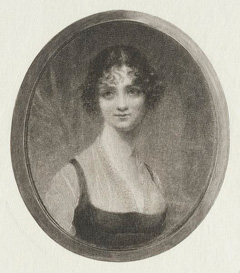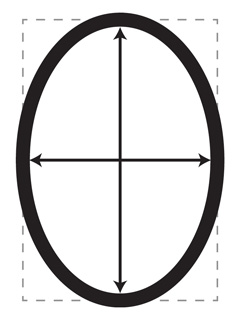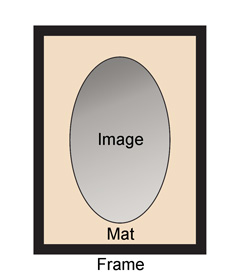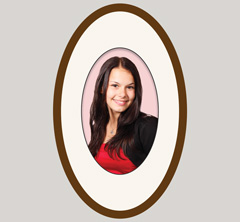| OVAL PICTURE FRAMES |
 |
|
Though in contemporary times they have not reached the popularity square angle frames have, oval frames - not to mention the circular shape in general - have been used in artwork display for centuries.
Not surprisingly, the selection for rounded-angle frames is more limited than rectangular or square frames, due to the greater complexity of their construction. This article explores the common sizes, materials, and styles of oval frames available on the market today.
|
SUMMARY
| OVAL FRAME SIZES |
FRAME MATERIALS |
FRAME CONTENTS |
WHOLESALE |
| Oval frames are available in pre-made and custom sizes. Standard sizes are similar to rectange, and include 4x6", 5x7", and 8x10". |
Oval frames may be made from wood or plastic. Wood frames may be cut from a rectangular frame or a solid wood block. Plastic frames are usually made in a mould. |
Glazing - glass or plexiglass, backing, and mats can all be custom-cut to fit oval frames. Oval mat and glass cutters are available. |
A number of online companies offer oval frames - both custom and standard sizes - at wholesale prices. |
|
| ANTIQUE OVAL FRAMES
|
 |
|
From the 1800s to nearly the mid-20th century, oval and circular frames were a popular frame style. Some of the companies who first began producing this frame shape in the 19th century are still in business today.
Oval and round frames were often used for portraits, first oil paintings, and eventually photographs. It is rare to see a subject other than people (or pets!) in an oval frame. This may be due to the fact that few other scenes fit as neatly into the rounded space without losing required background. If a landscape was framed in this style, it generally depicted a central human figure. Oval frames were also very popular for mirrors, and this is perhaps a more popular use for them, today.
The most common oval frames were natural wood grain, with a stain or varnish to achieve the desired color. They were displayed both vertically and horizontally, both on the wall and propped with a easel on tables, desktops, mantles, and grand pianos. Rectangular frames with an oval opening were also used.
One unique feature of these vintage frames was the tendency to fill them with convex glass, which curved out away from the frame. Traditionally, the photograph behind the glass would also be convex in shape - as deep as three inches! This may have been done in order to give the images a three-dimensional appearance.
|

Old portrait in a simple, circular frame
|
| OVAL FRAMES SIZES
|
 |
|
Both pre-made and custom-cut oval frames can be purchased. Generally, custom frames will be of high quality while standard sized framed are mass-produced. However, small companies that offer standard size oval and circular frames usually achieve the same quality as custom frames.
Not surprisingly, custom oval frames are quite expensive. If your budget is limited, you will want to ensure whatever you are framing can be displayed inside a standard oval frame size. Remember, you can always add a mat to take up additional space - these are much simpler to custom-cut.
Oval frames are available in the following standard sizes, similar to standard square frames. Bear in mind the measurements are from the widest point, and do not account for the corners that will be cut off in the curve of the shape.
Just like rectangular frames, oval frame dimensions are measured from the inside of the frame, behind the lip. The dimensions listed for the frame will always be the back opening size, not the outer dimensions of the frame. If the face width of the frame is listed, double this measurement and add it to each dimension to determine the outside size (8x10" frame with 2" face = 12x14" outside dimensions).
- 3.5x5"
- 4x6"
- 5x7"
- 8x10"
- 9x12"
- 16x20"
Some manufacturers also offer more unique sizes such as:
- 4x5"
- 6x8"
- 9x13"
- 14x17"
- 16x20"
Circular frames may be available in a wider range of sizes.
|

Oval frame measurements - image must be trimmed.
|
| MATERIALS FOR OVAL FRAMES
|
 |
|
The most common materials for oval frames are wood and plastic.
Traditional frames were, of course, made from wood, and many vintage or replica options exist today. However, due to the added complexity of making an oval frame from wood, plastic is a popular and less costly alternative.
WOOD FRAMES
Oval frames are often made by cutting an oval shape from a wider square or rectangular frame. Because of this, most wooden oval frames will have visible joints that look like the mitered edges of a square-angle frame because that is technically what they are. The frame's mitered or finger-jointed corners will be glued or wedge-nailed just like a regular picture frame. If no joints are visible, the frame likely has a plaster or thickly painted face.
This article from Popular Woodworking Magazine outlines how to make your own oval wood picture frame in this style.
Some manufacturers may also make oval frames by cutting the shape from a single block of wood.
PLASTIC FRAMES
Plastic picture frames come in a huge range of shapes, sizes, and styles, from tiny and plain to huge and ornate. This is possible - and more common than in wood - because the liquid plastic material can simply be poured into a mould to create a solid, single-piece frame of any design. Also known as acrylic frames, they may be finished to look like antique wood frames, or painted bright colors for a modern twist.
|

An ornage, gilded, wood oval frame
|
| OVAL FRAME CONTENTS
|
 |
|
Though it can be complicated in itself, finding an oval picture frame isn't the largest issue when planning to frame an artwork. You also need to account for the mats, glazing (glass or plexiglass), and backing board (foam board or other material).
MATS
Our article on Mat Cutters mentions a special type of handheld mat cutter, designed especially for cutting oval and circular mats. Though using a compass and blade will also work, a mat cutter will allow you to achieve that smooth, attractive bevelled lip much sought after in traditional framing. Of course, Computerized Mat Cutters (CMCs) can also cut circular and oval mats.
Generally, the mat size guidelines are the same for oval frames as for rectangular frames: the larger the frame, the wider the mat should be. Avoid pairing a frame with a mat that is thinner.
Another way to use mats to get a similar result, and avoid the potential extra cost of an oval frame, is to have the mat opening for a rectangular frame be cut in an oval shape. In this way, the image will be framed by a rounded border, but still fit in a regular frame, with rectangular glazing and backing.
GLAZING
Glazing can be a bit trickier to cut on your own. Specialized cutting tools are also available for this process, though they are primarily used by glass and stained glass artists. Handheld cutters are most common, and often come with a suction cup on the base, to easily secure the cutter to the center of the glass before setting the blade and scoring the material.
Some companies that manufacture oval frames also offer convex glass, though today the images behind are usually flat.
BACKING
Backing board is perhaps the easiest to achieve an oval shape. An oval mat cutter can be used (though foam may wear out the blade more quickly), or it can simply be traced and cut. Because it will not show, the cut of the backing does need not be as flawless as the mat.
If you're cutting your contents at home, avoid the temptation to trace your backing from the inside of the oval frame. This is the window opening, but your contents must be wider than this. If you do plan to trace the frame, be sure to add about 1/4" all the way around (or the exact measurement of the lip) before cutting.
|

An oval opening in a rectangular frame provides a similar look

Matted oval frames are a great option for modern portraits
|
| OVAL CUTTERS
|
 |
|
A specific, handheld saw is required for cutting oval picture frames, but the mats and glazing can be cut to size using a smaller, simpler tool.
Oval mat cutters come in two styles: large, tabletop devices similar to those used to create square-edge mats, and smaller, handheld options.
A cutter like the Logan 201 is an easy tool to tuck away when not in use. The cutter is held in the center of the mat and the blade, which extends on a rotating bar and is angled for a clean, bevelled cut, is drawn around the base to make first the outer cut and then the inner cut.
Handheld cutters like this one are generally limited to an outside cut of around 20" (ie: a 10" blade). They cost around $60.
Mat cutters like the Valiani Mat Pro, feature a more permanent set up and greater flexibility in dimensions and thicknesses. This particular one can cut ovals up to 32x23", and offers interchangeable heads for glazing as well.
Large, professional cutters can run anywhere from a few hundred to a few thousand dollars, and are often available second hand.
Dedicated glazing cutters look very similar to a handheld mat cutter. Some, like the Fletcher Circle & Oval Glass Cutter, have a suction cup attached to the base, so the tool adheres firmly to the glazing when cutting. This may not be useful, however, if you prefer to leave the protective paper cover in place when cutting.
This particular glass cutter can cut glass as thick as 1/4", in diameters up to 24".
As mentioned above, many full-size tabletop mat cutters include a blade for cutting glass or acrylic as well.
|

The Logan 201 oval mat cutter
|
|
At KeenART Media, we offer a selection of oval picture frames in popular standard sizes.
We also stock more than 400 picture frame mouldings for rectangular or square custom-made frames, from simple, natural wood to ornate, gilded faces.
If you have questions about any of our services or products, don't hesitate to contact us. Our knowledgeable staff is always happy to assist with answers, advice, or suggestions.
|
| Oval Picture Frames FAQs: |
 |
Q1 : Do you offer custom-made oval or round picture frames?
At this time we are unable to cut custom-made round frames. We do, however, offer solid wood oval frames in a few custom sizes. Please see our Oval Picture Frames order page for more details.
Q2 : How do I know what size oval picture frame I need?
Oval frames are measured from the widest point on each side, and from the inside of the back opening (behind the lip). If your image is an 8x10" rectangle, you will likely need an 8x10" oval frame, though you will need to cut away the corners of the image.
Images where the subject matter is somewhat removed from the foreground work best for oval frames. If the image is a portrait where the person's head takes up most of the space, it is probably too close up to work in an oval frame. If it is possible, do not crop the image before printing, to leave more space to trim away.
|
|
| If you don't find the answer you're looking for here, please contact us. |
|
© 2002-2025 - KeenART Media Ltd.
|
|
| |
|

